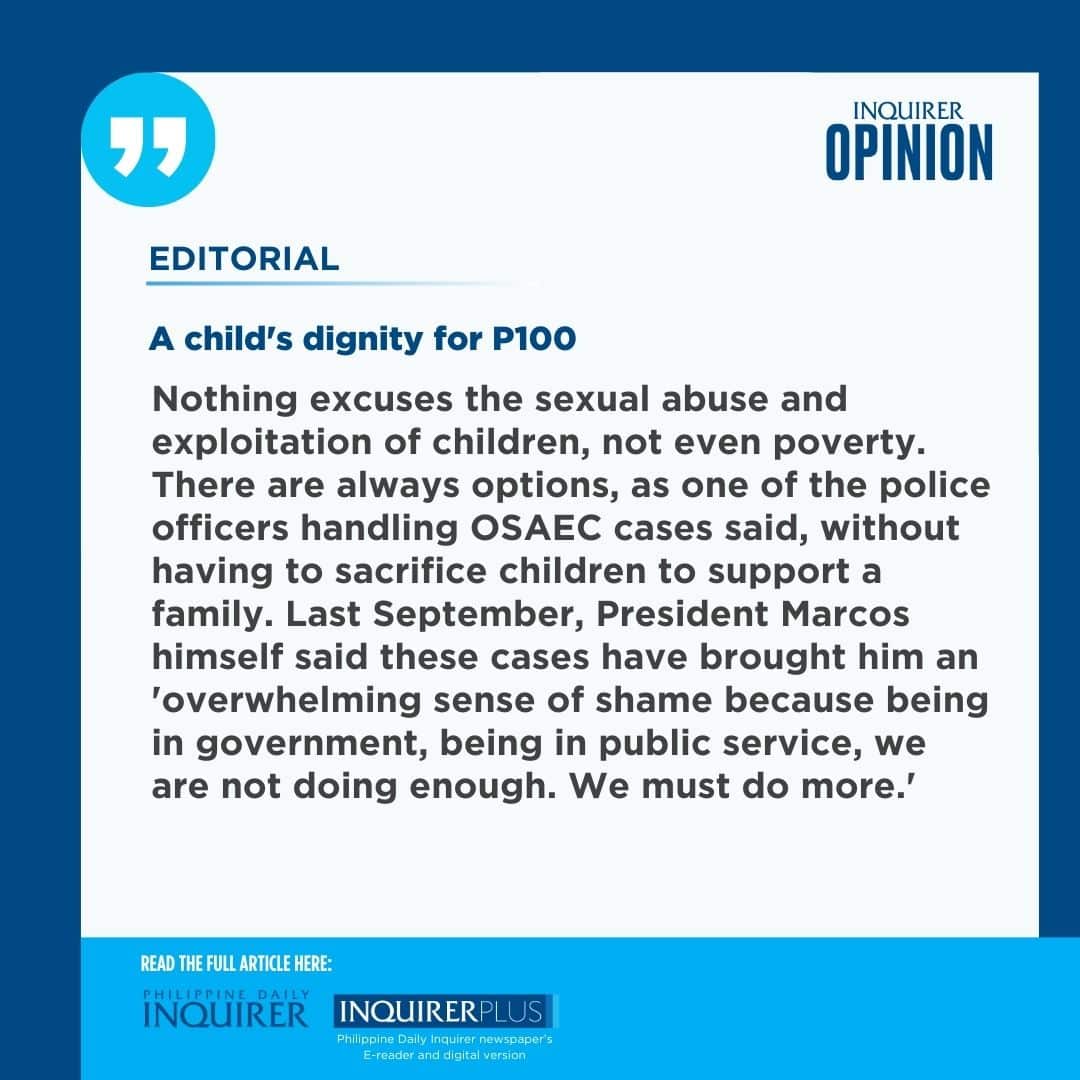
The online sexual abuse and exploitation of children (OSAEC) has worsened that explicit videos involving minors are now being sold on the internet for as low as P100 (less than $2 in current exchange rates).
One of the main factors for the proliferation of these videos, the Council for the Welfare of Children (CWC) said, is digital payment gateways that have made it easy for perpetrators to earn “easy money.” CWC executive director Angelo Tapales said authorities should make it difficult for the perpetrators to commit these crimes to decrease supply and make it prohibitive. “There are reports that [videos] are priced for as low as P100 because the volume is high, so the price is decreasing,” he said.
Technology, which has made it easy for on-demand crimes to be committed on the internet, has undoubtedly contributed to the alarming rise of OSAEC over the years. According to previous media reports, many buyers of these services—whether through recorded videos or live streaming—come from Western countries like the United States and Australia. A report by the Norwegian police last week has also revealed more disturbing findings: that Norwegian men were among the top buyers of “direct order-based sexual abuse” or DOBO with majority of those who sell such abuse residing in the Philippines.
‘Disgusting’
The Philippine Internet Crimes Against Children Center (PICACC), which was established in February 2019, has been working with police from other countries, including the Australian Federal Police (AFP), to combat child exploitation. As of December last year, PICACC has saved 661 victims and arrested 135 facilitators. In a special report last year, the Australian Broadcast Corp. (ABC) noted: “The demand for live streaming child sexual abuse is so high in Australia that AFP officers are now based permanently in the Philippines working with an international task force investigating this distressing cybercrime.”
In 2022, a former public servant named Ian Ralph Schapel from Adelaide was sentenced to a 16-year jail term for sexually exploiting children in the Philippines. His youngest victim was 3 years old. In a chat log tracked down by Australian police, Schapel told a facilitator, “Age is no problem with me.” He paid as low as A$40 (about P1,500) to watch the victims being sexually abused and exploited.
Authorities familiar with OSAEC cases could only describe the crimes committed as “disgusting.” Per the Norwegian police report, facilitators behave like an organized crime syndicate with most of the DOBO sellers being Filipino women. Other police investigations have also found that majority of facilitators are the children’s family members, particularly parents. A mother who was arrested in 2022 for selling her children for online sex told ABC in an interview that she did it “to survive.” She said she lost her job during the COVID-19 pandemic and she couldn’t allow her family to go hungry.
Worsened by COVID
In a report released in April 2023, the Anti-Money Laundering Council (AMLC) said the limited movement during the pandemic and people’s “financial desperation” made OSAEC prevalent. “The growing demand and availability of child sexual exploitation materials especially during the pandemic has exacerbated what is already a serious problem in the country,” it said. It saw an increase in OSAEC-related “suspicious transaction reports (STRs),” from only 204 in 2015 to 92,200 by the end of 2022. AMLC also monitored an aggregate amount of P1.56 billion of STRs from the second half of 2020 until the end of 2022.
Nothing excuses the sexual abuse and exploitation of children, not even poverty. There are always options, as one of the police officers handling OSAEC cases said, without having to sacrifice children to support a family. Last September, President Marcos himself said these cases have brought him an “overwhelming sense of shame because being in government, being in public service, we are not doing enough. We must do more.”
Unicef recommendations
There is no lack of people working tirelessly to stop these crimes, as was evident in ABC’s special report, but the government should do more to support these institutions. For example, it took eight hours for police officers to present evidence so a judge could issue a search warrant. Although they arrested the perpetrator, the victim was gone by the time they arrived at the house. Unicef has recommended less stringent requirements in obtaining search warrants and to exempt OSAEC cases from the anti-wiretapping law.
Government must pour resources into technology to stop or prevent these online crimes. It is also crucial that institutions providing aftercare and rehabilitation to victims who are saved from these horrific situations are given substantial budgets. These children can no longer redeem their lost childhoods, but they should be guided and assisted to live better lives in their adulthoods.
The challenge, therefore, not only this National Children’s Month but every day, is to create a world where children can grow up safe, their rights protected, and their dignity intact.

